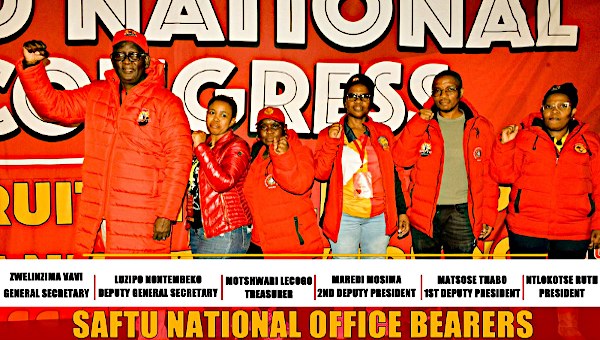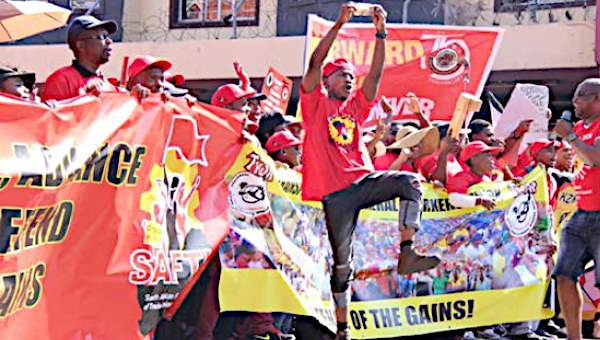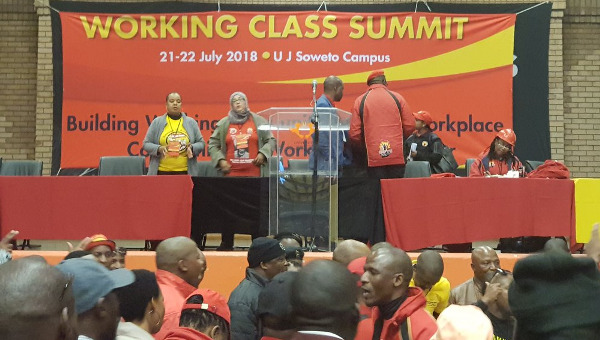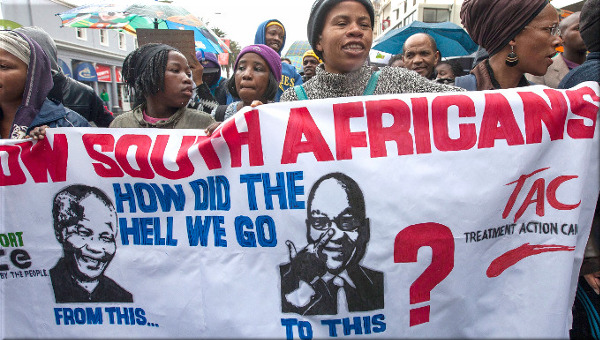Declaration of the Launching Congress of the South African Federation of Trade Unions
The South African Federation of Trade Unions (SAFTU) has been born. We have passed a milestone in the history of the South African trade union movement at this Launching Congress held in Boksburg from 21-23 April 2017.
700,000 workers represented by 1,384 voting delegates from 24 unions and other non-voting unions have taken the first decisive step to building a new, vibrant, independent, and democratic workers’ federation, leading the struggle against exploitation, mass unemployment, poverty, inequality and corruption and taking up the struggle for the total emancipation of the working class from the chains of its capitalist oppressors.
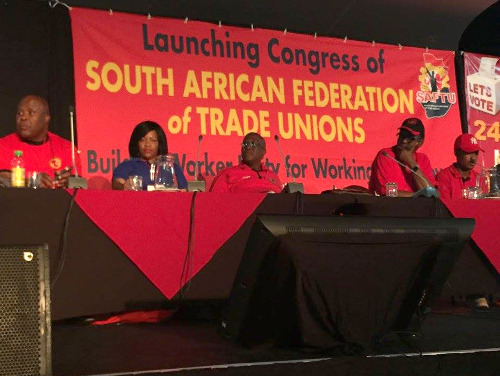 Delegates formally adopted the name, logo and colours of red, black and gold. A constitution was adopted and a Report from the Steering Committee which spelled out the way forward for the coming period, and endorsed the principles adopted by the Workers’ Summit on 30 April 2016.
Delegates formally adopted the name, logo and colours of red, black and gold. A constitution was adopted and a Report from the Steering Committee which spelled out the way forward for the coming period, and endorsed the principles adopted by the Workers’ Summit on 30 April 2016.
We are building a fundamentally different type of workers’ organization – independent of political parties and employers but not apolitical – democratic, worker-controlled, militant, socialist-orientated, internationalist, panafricanist from a Marxist perspective and inspired by the principles of Marxism-Leninism.
Our historic mission is to rapidly build a united mass force of workers, which will transform their lives and pave the way for the transformation of society as a whole from one based on the greed of a rapacious capitalist elite to one run for the benefit of the working class and all the people of South Africa and the world.
But time is not on our side. Unless we urgently mobilize our forces to confront the quadruple challenge of unemployment, poverty, inequality and corruption and revive the trade union movement, turn the tide and fight back against their appalling conditions of life, we shall slide into a new age of barbarism, and even worse exploitation of the working class and the poor.
Principles and Character of the Federation
We have built on the founding principles adopted by the Workers’ Summit on 30 April 2016, made important additions and adopted the following:
1. Independence: Unions must be independent from employers (in the private and public sector) and from political parties. This does not mean that unions are apolitical.
2. Worker control and democracy: Unions must be worker-controlled and practice democracy, accountability, transparency and be tolerant. Within the federation affiliates must have autonomy.
3. Non-racialism and non-sexism: Unions must fight for the maximum unity of all workers and reject all divisive and negative sentiment such as racism, xenophobia, tribalism and ethnicity, all of which are the product of the capitalist system which exploits divisions within the working class. We should welcome and recruit migrant workers.
4. Financial self-sufficiency and accountability and opposition, in word and deed, to business unionism, corruption, fraud and maladministration within its own ranks and in a capitalist society which is inherently corrupt, which we must fight continuously and support workers exposing corruption, e.g. Prasa and all state-owned industries, and the former Midrand municipality
5. Internationalist and anti-imperialist: Unions must place a high priority on international solidarity.
6. Socialist orientation: We are committed to fight the exploitation of workers and must be ready to engage in the transformation of our societies to counter capitalist exploitation, inequalities and poverty. We are inspired by Marxism-Leninism and Marxist panafricanism, based on a commitment to socialism, internationalism, all of which are complementary.
7. Militancy in fighting for the working class and the poor: Unions must be ready to actively campaign for change, and made links with all of the oppressed South Africans.
8. We are committed to build effective organization and representation and organize in the most effective manner to represent workers and serve their interests.
9. We pledge our solidarity with all workers struggling for better wages and conditions of service or to save jobs and to do everything possible to save and create jobs.
Campaigns
Our struggle is to end class exploitation, and to dismantle colonial and apartheid capitalism and land dispossession, through a programme to reclaim land and for a socialist-orientated society. In pursuance of this we shall take up the following campaigns:
- We support the Section 77 Notice submitted by the Steering Committee. In addition to its demand on unemployment, poverty and attacks on workers’ constitutional right to strike, we demand the banning of labour brokers, action to resolve the health crisis, for land to be restored to its rightful owners without compensation, for the scrapping of e-tolls and toll gates and the repeal of the Employment Tax Incentive Act.
- Workers pension funds should be invested in projects which build houses for the workers and the poor, not to finance glass office towers in Sandton.
- We demand an urgent moratorium on farm evictions of farm workers and demand that the states restore their dignity by building better houses for dwellers, who now live in houses that are no better than pigsties and go hungry even though they are the producers of food. We resolve to mobilize a campaign to end the abuses they suffer from and the fraudulent attempt to form “co-operatives” which are just fronts for the employers.
- We shall mobilize workers to oppose Eskom’s planned closure of five coal-powered power stations, which could produce 30-40,000 job losses, fight the partial privatization of Eskom by involving independent power producers, step up the campaign against nuclear energy and develop a position on transition to socially owned renewable energy.
- We shall convene a Bargaining Conference to fight the attempts by the Free Market Foundation and employers to liquidate collective and centralized bargaining, and shall mobilize mass action to stop this attempt.
- We shall resist with everything in our power a developing strategy by the state and their sweetheart unions to deny workers their right to join trade unions and condemn employers who refuse to grant union rights and the Department of Labour, which insists on a certificate from employers that they are prepared to process debit orders, and we condemn those employers in the public service who collude with COSATU unions to exclude independent unions and maintain conservative policies. We also call for amendments to Section 21 of the Labour Relations Act.
- We demand changes to the Pensions Amendment Act and support the call for public servants to be able to use their own pensions for housing for public servants who can’t get loans because of indebtedness and don’t qualify for RDP houses.
- GEMS should be a choice not compulsory, as it doesn’t work in favour of public servants. Medical aid is exorbitant and the National Health Insurance still a dream; we are not deserting it but need immediate measures. We created GEMS, but its board is now dominated by COSATU unions.
- We shall tackle the health crisis, where we see long queues only to receive a panado while the minority enjoy private care. Emergencies are not attended to and indignity and even death is imposed on psychiatric patients through outsourcing. We shall demand public quality service like in Cuba.
- The education crisis is a core issue. We shall convene an education crisis summit, which will focus on the class basis of a system which generates unemployment and poverty and creates workers who are only meant to serve the interests of the capitalists and the state is limited to what the capitalists allow them to do. SA’s education system is worse than those of many poorer countries.
- We shall fight against food dumping, e.g. chickens and job losses linked to sugar tax, and against the use of EPWP Workers, which is used as a form of increased casualization of work in local government and exploitation.
- Banks must be nationalized, in particular the Reserve Bank, not just mineral resources.
Recruitment and Organization
- We shall immediately launch a recruitment campaign which must focus on the 76% of unorganized workers, but should also target COSATU affiliates because they are considered as unorganized and trapped. Shop stewards must be capacitated to take up recruitment and service.
- Unions should support each other’s struggles and big unions give special material help to small unions and not just look after their own interests. No union should further expand its scope. We must encourage mergers where it makes the union more effective and makes organizational sense, but in the meantime unions in the same sector should cooperate.
- There are disturbing developments in Nedlac proposing laws to ensure that all strikes must be peaceful, which ignores the problem that violence in strikes is instigated by employers who use police and private security to provoke and harass strikers.
- We strongly condemn the refusal by government to recognise unions which have recruited in parastatals and the public service, which undermines the right to freedom of association. Those workers who have joined a union of their own choice must be given organizational rights including stop orders. We shall declare war on the political interventions by government.
- We shall discuss with all unions about how best to deliver quality service – working toward the development of a service charter.
Economic, Social and Political Crisis
The current crisis, which is simultaneously political, economic and social, is rooted in the Codesa negotiated settlement which led to the end of apartheid. The settlement conceded democratic political rights, but ensured that the economy remained firmly in the hands of white monopoly capitalism, through the property clause.
This led to capture of the state and the government, the ANC and its allies by monopoly capital, and to the adoption of neoliberal, free-market capitalist economic policies in their interests. This started with Gear which was followed by the NDP. The Treasury and successive Finance Ministers were the main drivers of this process.
At the same time a section of black capitalists who were excluded from the mainstream capitalist economy, colluded with Zuma, his cronies, public officials which he appointed, and the Guptas to embark on an orgy of looting of public resources and self-enrichment through the manipulation of tenders in both the state and state-owner enterprises.
SAFTU opposes both these factions of the ruling class and refuses to take sides to defend either the corrupt looters or the mainstream white monopoly capitalists who are both fighting each other for control of the state and government for their own selfish class interests and not those of the working class and poor majority which they both exploit. We shall never support one butcher against another.
The federation will oppose any attempt to resolve this crisis within the parameters of a capitalist system which has proved that it has no solutions. It is the working class who produce the country’s wealth and who are the main consumers of its commodities.
The only way out of the crisis has to be through a mass movement of the working-class based on a program guided by the principles of Marxism-Leninism for the nationalization of the mineral and manufacturing monopolies, the banks and the land, in line with the aspiration expressed in the Freedom Charter. This discussion will be further developed in an Ideological and Political Commission.
Conclusion
At this historic Congress, we have asserted our independence and enshrined it in our decisions. We have insisted that we must be independent, but definitely not apolitical. On the contrary, being independent means that we have to be more ready to explain our positions, because these are rooted in the needs of the working class.
The new federation can show how different it is from other formations by showing that its principles are not just slogans, but guide our programmes in all that we do. There are huge expectations amongst the working class for SAFTU, and therefore have to live up to these expectations of the workers.
The new leadership that is elected to lead the New Federation are conscious of the very different traditions that we are now encompassing. Our differences are not a weakness, but an advantage, especially if we draw upon them to strengthen our overall approach.
Viva SAFTU Viva! •
President: Mack Tshabalala of NUMSA
1st deputy president: Nomvume Ralarala of SALIPSU
2nd deputy president: Thabo Matsotse of SAPU
General Secretary: Zwelinzima Vavi of NUMSA
Deputy GS : Phakedi Moleko of FAWU.
National treasurer: Motshwari Lecogo of NUPSAW
Issued by SAFTU, 23 April 2017.
Opening Address by Raymond Mnguni
Comrade Chairperson, delegates, visitors and friends. On behalf of the Steering Committee I welcome you all to this historic gathering.
It is a great honour and privilege to be asked to deliver the opening address of such a momentous event. The long wait is over. The new dawn has broken. A milestone has been reached in the history of the South African trade union movement.
We are here to build a new, vibrant, independent, democratic and militant workers’ federation. We are here to lead the struggle against exploitation, mass unemployment, poverty, inequality and corruption. We are here to forge ahead in the struggle for the total liberation of the working class from the chains of its capitalist oppressors.
As the Steering Committee report documents in great detail, this congress could not come at a more crucial time. Workers face the most serious crises since the end of apartheid. Unemployment is at one of the highest levels in the world, and thousands more jobs are now under threat – in Eskom and related transport services, the chicken industry, cold drinks manufacturing and the media.
More and more of the jobs that remain are insecure and low-paid, as formerly permanent jobs are lost through outsourcing, casualization and exploitation by labour brokers.
An army of vulnerable and marginalized workers is growing fast. Employers and the government are striving to sabotage collective bargaining and drive down wages to the lowest level which desperate workers will be prepared to accept. They are moving through Nedlac to restrict our basic, constitutional right to strike.
Militant Trade Union Movement
Yet just when there is a greater need than ever for a strong, militant trade union movement, the existing ones are fragmented and weak. According to the Department of Labour, in February 2016, there were 182 unions registered in our country, with another 400 unions waiting to be registered.
There are also thousands of workers in unions which are letting them down, workers who are demoralized by their leaders’ inactivity and opportunism, especially those in COSATU, who are embroiled in factional battles within the ANC and government and have failed to wage any fightback against their allies’ pro-capitalist and anti-worker policies.
Worst of all, more than three quarters of workers are not organized in any union at all, most of them in the most vulnerable sectors – part-time or casual workers who have no permanent employer of workplace, farm and domestic workers, the very workers in the greatest need of a strong trade union.

Photo: NUMSA – Facebook.
That is why one of our main tasks over these three days is to target these vulnerable workers, to revive their hopes and give them a route out of their misery. We must recognise the changing nature of the labour force, move beyond traditional areas of scope and recruit these vulnerable, unorganized workers.
As the Steering Committee report says:
“We must rise above the petty squabbles that often characterize relations between unions and federations. Our country, our continent, and indeed the workers of the world, are going to be faced with monumental challenges over the next period. We have to be a beacon that attracts all workers, regardless of their union traditions, back to the front line of the class struggle.”
All these, and many other challenges will be discussed in much greater detail in the discussion around the Steering Committee Report later today. But my mandate is to give a brief summary of the history of the activities of the Steering Committee and how we have arrived at this historic congress today.
In 2014 members of the COSATU Central Executive Committee voted to expel 340,000 members of NUMSA, and in 2015 to dismiss its General Secretary, Comrade Vavi. A group of COSATU affiliates which opposed these decisions, later to be known as the “9 plus unions,” worked together to try to restore democracy, accountability, worker control and political independence to COSATU.
Meanwhile hundreds more members and officials were expelled from individual COSATU affiliates, many of them for exposing corruption and the embezzlement of union funds, others for their opposition to the COSATU leaders’ policy of propping up a dying and irrelevant Alliance, and an ANC and SACP that had abandoned their historical mission.
It became clear, particularly after the two disastrous COSATU Congresses in 2015, where FAWU and other members of the 9-plus fought bravely to turn the tide, that the leadership clique of COSATU would never accede to demands for worker unity, democracy and independence. They were never going to be the driving force for workers’ unity and fulfill the historic call for “One Country, One Federation.”
A new force for workers’ unity started to emerge. Discussions began between the Presidents of NACTU, FEDUSA and the former General Secretary of COSATU, who mutually agreed to convene a meeting of all unions that endorsed certain principles, including that the unions must be independent from employers and political parties, worker-controlled and democratic.
A historic meeting on 7 September 2015, attended by 26 unions, agreed to search for unity on the basis of trade union independence and democracy. This meeting laid the basis for working toward a Workers’ Summit and the eventual formation of a New Trade Union Federation. A Steering Committee was elected, comprising leaders of all participating trade unions.
Unfortunately almost immediately after the establishment of the Steering Committee, FEDUSA backed away, without ever making a written commitment to the New Federation and its principles.
Workers’ Summit
NACTU remained in the Steering Committee and participated, together with some of its affiliates (including AMCU) in the magnificent Workers’ Summit, which took place 30 April 2016, attended by 1500 trade union representatives, representing 52 unions attended together with 22 civil society organizations as observers.
NACTU also participated actively in the May Day Rally convened by the Steering Committee the next day, 1 May 2016. However, it then also retreated, as did Solidarity, who enthusiastically attended the Workers’ Summit and endorsed its final declaration, but then retreated, apparently back into the Afrikaner Laager coordinated by Afriforum.
The Workers’ Summit adopted a declaration called for concrete steps to be taken to launch a new, militant independent trade union federation and agreed to adopt the following founding principles, which of course you, at this launching congress, may endorse, amend and or reject.
1. Independence: Unions must be independent from employers (in the private and public sector) and from political parties. This does not mean that unions are apolitical.
2. Worker control and democracy: Unions must be worker-controlled and practice democracy, accountability, transparency and be tolerant. Within the federation affiliates must have autonomy but not independence, but differences of opinion must be tolerated.
3. Non-racialism and non-sexism: Unions must fight for the maximum unity of all workers and reject all divisive and negative sentiment such as xenophobia etc.
4. Financial self-sufficiency, accountability, and opposition, in word and deed, to business unionism, corruption, fraud and maladministration within its own ranks and in society as a whole.
5. Anti-imperialist and Internationalist: Unions must place a high priority on international solidarity.
6. Socialist orientation: Unions must be ready to engage in the transformation of our societies to counter capitalist exploitation, inequalities and poverty.
7. Militancy in fighting for the working class and the poor: Unions must be ready to actively campaign for change, and made links with all of the oppressed South Africans.
8. Effective organization and representation: Unions must organize in the most effective manner to represent workers and serve their interests.
9. Solidarity: with all workers in struggle for better wages and conditions or to save jobs.
10. Support for workers exposing corruption, e.g. Prasa and Midrand municipality.
To prepare for this congress of the New Federation, the Steering Committee on 7 March 2017 applied for registration with the Department of Labour, under the name of the South African Federation of Trade Unions.
All documents, including membership affiliation, were found to be in order, and the Registrar wrote to the Convenor of the Steering Committee on 23 March 2017 to state that the registration application was successful and the registration was gazetted on 31 March 2017. Should the congress decide to adopt a name other than SAFTU, the name change will be submitted to the Registrar.
We still face immense challenges, which the new leadership will have to confront urgently, because time is not on our side. We have to confront the quadruple challenge of unemployment, poverty, inequality and corruption and revive the trade union movement.
If workers cannot turn the tide and fight back against their appalling conditions of life, we shall slide into a new age of barbarism, and even worse exploitation of the working class and the poor.
I wish you all a highly successful congress. It must be the starting moment of a new era of progress toward the realisation of the ideals of the Freedom Charter and the emancipation of the working class and the whole of humanity. •


